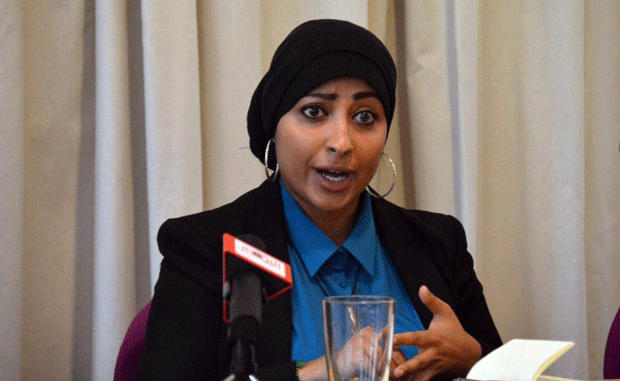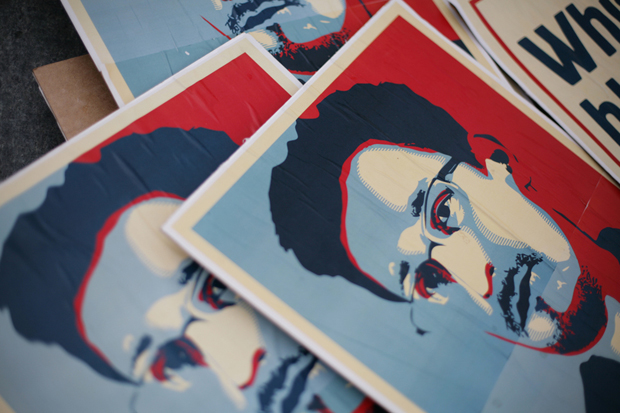09 Apr 15 | About Index, Azerbaijan Statements, Events, mobile, Press Releases

Download invitation
Should human rights activists call for boycotts of sports events hosted by repressive regimes? What responsibility do sports organisations have? How can journalists effectively cover the full scope of human rights, social and political issues surrounding the Baku European Games?
In June 2015, Azerbaijan’s capital Baku will host the first European Games under the umbrella of the European Olympic Committees. Controversy already surrounds this new sporting venture, following reports earlier this year that Azerbaijan will foot the bill for all 50 national Olympic teams to attend.
The country’s internal political situation gives further cause for concern. Over the last twelve months, a wave of arrests of key critics — including human rights activists, election monitors, lawyers and investigative journalists — has almost entirely silenced Azerbaijani civil society, leaving activists and journalists in exile to highlight the regime’s on-going attacks on freedom of expression. Several large NGOs have been closed and legislative amendments make it almost impossible for critical groups to get foreign funding. The government controls all broadcast media, and in December, it forcefully closed the Baku branch of Radio Free Europe/Radio Liberty, a US-funded media organisation.
Meanwhile, Azerbaijan continues an expensive PR campaign to promote its image abroad – with considerable success. International criticism has been largely muted; with the EU and the US looking at ways to foster closer and strategic ties with Azerbaijan.
During this interactive session, our panellists will explore the relationship between sport and human rights, examining the argument that Azerbaijan is using such high profile events to whitewash its image amidst criticism from domestic human rights activists as well as international bodies regarding its human rights records.
The panel, chaired by ARTICLE 19, will bring together Azerbaijani human rights activists, political commentators and international human rights experts. The panellists will include Emin Milli, a former political prisoner in Azerbaijan, now director of Meydan TV, Rebecca Vincent, coordinator of the Sport for Rights Campaign, Giorgi Gogia, Human Rights Watch’s senior researcher on Azerbaijan who was recently denied entry into the country, and others to be confirmed.
The event format will be as follows:
12.30 – 13.00: Arrival, lunch and informal discussion
13.00 – 14.00: Interactive session, featuring Azerbaijani journalists and activists as well as human rights experts.
14.00 – 15.00: Opportunity for one-on-one interviews/discussion with panel members
The Panellists:
Emin Milli is an activist, blogger and co-founder of Meydan TV, an alternative online Azerbaijani news service, operating from Berlin. In August 2009, Milli and Adnan Hajizada, (known as the “donkey bloggers”), were found guilty of hooliganism and imprisoned for more than a year after posting an online video satirising the Azerbaijani government.
@eminmilli
Rebecca Vincent is a human rights activist and former U.S. diplomat who has been working on Azerbaijan for nine years. In December 2012, her Azerbaijani residence permit was revoked in connection with her human rights work in the country, and she has been unable to return to Azerbaijan ever since. She is currently the coordinator of the Sport for Rights campaign.
@rebecca_vincent
Giorgi Gogia is a senior researcher at Human Rights Watch with over a decade of experience working on Azerbaijan. Giorgi was recently banned from travelling to Azerbaijan, preventing him from monitoring the trials of human rights defenders behind bars on politically-motivated charges. He was deported without any explanation after spending 31 hours in Baku’s Heydar Aliyev airport.
@Giorgi_Gogia
This event is hosted by Article 19, Human Rights Watch and Index on Censorship on behalf of the International Partnership Group for Azerbaijan (IPGA). The IPGA is a coalition of 22 international NGOs, coordinated by ARTICLE 19, working to promote and protect freedom of expression in Azerbaijan. The group arose from a broader International Partnership framework established by International Media Support (IMS) and Open Society Foundations (OSF) in 2010. Since then, the IPGA has engaged in joint advocacy around specific events, such as the Eurovision Song Contest and the Internet Governance Forum both of which were held in the Azerbaijani capital Baku in 2012; and has regularly raised issues relating to human rights in Azerbaijan at international and regional institutions, notably the Council of Europe – with Azerbaijan chairing the body’s Committee of Ministers in 2014. – Read more about the IPGA
Where: Frontline Club, 13 Norfolk Place, London W2 1QJ
When: Tue 28 April, 12:30pm
Tickets: RSVP at [email protected]
30 Jan 15 | Bahrain, mobile, News and features

Maryam Al-Khawaja spoke out in October for the release of fellow human rights activist Nabeel Rajab. (Photo: David Coscia for Index on Censorship)
Nine people have been arrested in Bahrain for “misusing social media”, a charge which is punishable by a fine or up to two years in prison.
Human rights defender Nabeel Rajab was last week sentenced to six months in prison over a tweet he posted which was deemed insulting to public institutions. Rajab has been bailed, and tweeted on 21 January that he will appeal his conviction on 11 February.
Human Rights Watch has dedicated seven pages of its 25th annual report to Bahrain. The World Report 2015, released on Thursday, reviews the human rights situation in over 90 countries.
The report states that over 200 defendants have been sentenced to long stints in prison by the Bahraini courts on charges of national security or terrorism, with at least 70 of those being sentenced to life.
It says: “Bahrain’s courts convicted and imprisoned peaceful dissenters and failed to hold officials accountable for torture and other serious rights violations. The high rate of successful prosecutions on vague terrorism charges, imposition of long prison sentences, and failure to address the security forces’ use of lethal and apparently disproportionate force all reflected the weakness of the justice system and its lack of independence.”
In December, co-director of the Gulf Center for Human Rights (GCHR), Maryam Al-Khawaja, boycotted a court hearing which saw her sentenced to one year in prison. Al-Khawaja was charged with assaulting two policewomen last year when she traveled to Bahrain to visit her father Abdulhadi, who is currently serving a life sentence for his involvement in anti-government protests in 2011. In related news, the GCHR website was yesterday reportedly blocked in the United Arab Emirates.
Al-Khawaja’s sister Zainab was arrested in October on charges of insulting the king, and gave birth to her second child just a few days before being sentenced to three years in prison. She was then sentenced to an additional 16 months less than a week later, on separate charges of insulting a public official.
This article was published on 30 January 2015 at indexoncensorship.org
16 Apr 14 | Digital Freedom, News and features, Politics and Society, United Kingdom, United States

(Photo: David von Blohn / Demotix)
Edward Snowden’s revelations on the voracious appetite of spying on all and sundry by the National Security Agency and allied agencies should not give pause for too much comment, other than to affirm a general premise: Activists and non-government groups are to be feared. Non-profits are seen as potential threats, though what to is sometimes unclear. Any government worth its salt should be afraid of its citizens – the latter must make the former accountable; the former must hold to the contractual bargain with citizens.
Last week, Snowden revealed to members of the Council of Europe via videolink from Moscow that such groups as Human Rights Watch and Amnesty International were high on the list of surveillance targets. “The NSA has specifically targeted either leaders or staff members in a number of civil and non-governmental organisations… including domestically within the borders of the United States.” He also delved further into such data mining programs as XKeyscore, a technology representing “the most significant new threat to civil liberties in modern times.” Analysts, using the program, can select the metadata of an individual, and find content, “without judicial approval or prior review.”
Dinah PoKempner, general counsel at Human Rights Watch, responded that, if true, it was “indicative of the overreach that US law allows to security agencies.” Such conduct “would again show why the US needs to overhaul its system of indiscriminate surveillance.” Indeed, it would fly in the face of a long held, if somewhat erroneous belief, that the US State Department actually treasures its human rights defenders, seeing them as the vanguard of reform rather than a cabal of troublesome dissent. Human rights defenders in allied countries, for instance, pose a different set of problems.
A cursory glance at the guidelines of the US State Department on supporting human rights reveals how, “Protecting and supporting human rights defenders is a key priority of US foreign policy…. The Department’s objective is to enable human rights defenders to promote and defend human rights without hindrance or undue restriction and free from fear of retribution against them or their families.” Stirring stuff. There is even a reference to US support for the UN Declaration on Human Rights Defenders, adopted by consensus of the General Assembly in 1998. Various strategies and techniques of encouragement are then discussed.
The guidelines even set out who human rights defenders are – those who “working alone or in groups, who non-violently advocate for the promotion and protection of universally recognised human rights and fundamental freedoms.”
Evidently, these guidelines did not quite cross the tables of those involved in the surveillance complex. This may well be partly due to bureaucratic bungling – the irresistible growth of the espionage complex, but it may just as well be seen as consistent: after all, the NSA watches, and the State Department disposes. The two occasionally seem to meet in fumbling circumstances.
The NSA is far from the only organisation engaged in the business of spying on activist groups and NGOs. A November 2013 report by Centre for Corporate Policy, a Washington, D.C. think tank, titled Spooky Business: Corporate Espionage Against Nonprofit Organizations, shows that such a process is addictive and systematic across centres of power. Aversion to dissent is endemic, and it attracts birds of a feather in both government and corporate circles. According to the report, the precondition for such espionage is that the non-profit organisation in question “impairs or at least threatens a company’s assets or image sufficiently.” The targets are varied, including “environmental, antiwar, public interest, consumer, food safety, pesticide reform, nursing home reform, gun control, social justice, animal rights and arms control groups.”
The report looks at the antics of numerous entities hungry for data on their threatening quarry. It might be the Society of Toxicology and Information Associates against animal rights activists. It might be Stratfor and Coca-Cola against People for the Ethical Treatment of Animals. Or BAE against Campaign Against the Arms Trade.
The gold target here seems to be Greenpeace, object of keen interest by the private security firm Beckett Brown International (BBI), retained by Dow Chemical, the world’s largest chlorine producer. The world’s largest operator of nuclear power plants, Électricité de France, has also hired a set of private intelligence firms to keep an eye on the activities of the organisation, be it through good old hacking or conventional spying. In November 2011, EDF was actually fined €1.5 million for “industrial espionage”, and two of its executives jailed.
Activities include infiltration, cultivation, deception. Trash bins are searched. Offices are cased, phone records of activists collected, confidential meetings breached. Names are blackened; the severity of disasters – environmental, notably – are minimised. According to Russell Corn, the managing director of Diligence, a corporate intelligence agency, anywhere up to 25 per cent of an activist camp will be “taking the corporate shilling” (New Statesman, Aug 7, 2008). An inflated figure, perhaps, but worth keeping in mind.
Such behaviour illustrates all too well that there is a conflict of an international, global dimension between established centres of corporate and government power against those who would reform, or at the very least challenge, them. When convenient, corporate and government interests will collude and find accord. There is even an argument to be made that their functions and interests have become, at points, indistinguishable.
Nothing illustrates this better than the privatisation phenomenon of intelligence activities, where traditional espionage is outsourced and redeployed with contracting agencies and their employees. The private investigative firm Hackluyt, retained by BP and Shell, has a direct line to MI6. Some irony, then, that Snowden was working for one such agency when he acquired his invaluable treasure trove of surveillance activities.
This article was posted on 16 April 2014 at indexoncensorship.org
05 Mar 14 | Europe and Central Asia, Events, United Kingdom

Human Rights Watch (HRW) is one of the world’s leading independent organisations dedicated to defending and protecting human rights. They work tenaciously to lay the legal and moral groundwork for deep rooted change and fight to bring greater justice and security to people around the world. Through their Human Rights Watch Film Festival they bear witness to human rights violations and create a forum for courageous individuals on both sides of the lens to empower audiences with the knowledge that personal commitment can make a difference. The film festival brings to life human rights abuses through storytelling in a way that challenges each individual to empathise and demand justice for all people.
The HRW Film Festival takes places in different cities across the world between January and March. In London, it runs 18-28 March. Full programme is available here.




